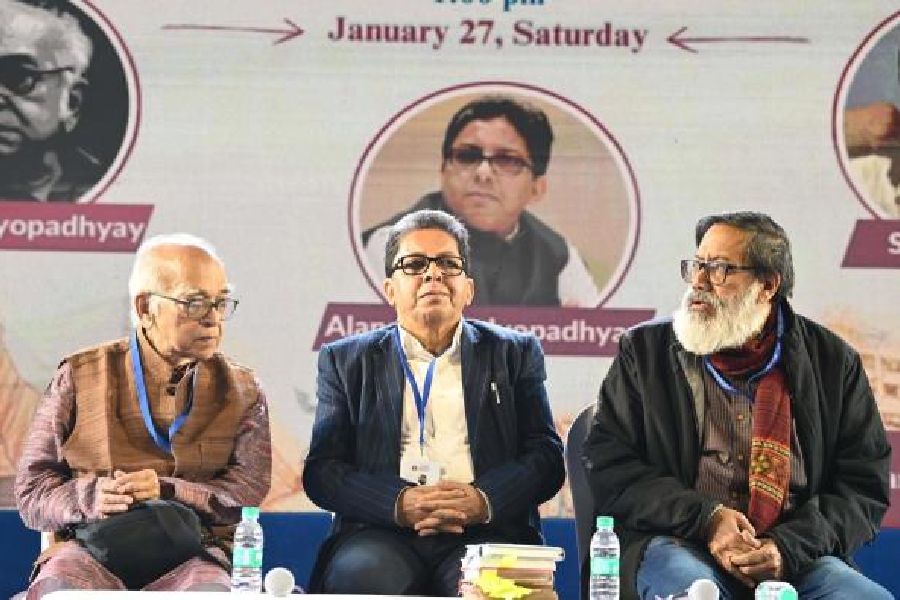The year 2024 is the birth centenary of three of the most creative minds from Kolkata — author Samaresh Basu, poet Nirendranath Chakravarti and filmmaker Mrinal Sen.
Kolkata Literature Festival, in association with The Telegraph, paid homage to all three at a session titled “Shatabarsher Aloye” on Saturday afternoon. The festival is being held at Kolkata Book Fair.
Publisher-editor-author Samik Bandopadhyay, one of the speakers at the session, reminiscenced how in a previous edition of Kolkata Book Fair, Samaresh Basu had sought him out, taken him to a tea stall and shared with him over a cup of tea his disappointment at his book not being selected for translation by a multinational English language publisher.
Bandopadhyay subsequently translated and published some of his novels. “He wasn’t someone to broadcast his disappointment. He would talk about it only to close friends,” said Bandopadhyay, who pledged to read Basu through his centenary year.
Basu was imprisoned in 1949 because of his involvement in Left politics. He started writing in jail. His first novel was Uttaranga. And later there were a host of others, including Nayanpurer Mati, BT Road er Dhare, Srimati Cafe and Morshum er Ekdin.
“He used to write about his political experiences. His life in the Barrackpore sub-division, Jagaddal and other places. His Leftist thinking and consciousness of history during the 40s and 50s shaped the characters of his novel. They would be from north Bengal, Bihar, Odisha and Assam. They would come up from the tea gardens or the agricultural lands or factories. He would write stories about them, about those from the slums on BT Road who would be rendered homeless by scheming politicians. He also narrated stories of the people at Srimati Cafe,which again would be ruined. The author has chronicled a painful history of the times,” said Bandopadhyay, while ruing the typos in his books.
Alapan Bandyopadhyay, chief advisor to the chief minister, spoke of his father-in-law Nirendranath Chakravarti, who he said was a poet of some of the most turbulent times.
His first poem was published in 1945. “That was a very turbulent time. It was after World War II, students’ movement, naval mutiny all were happening during that period,” he said.
Chakravarti also wrote about the refugees who came after Partition, how they saw themselves in the new surroundings after being uprooted, their thoughts, and their anxieties. He had left his hometown of Faridpur in undivided Bengal (now in Bangladesh) when he was small.
“He always spoke of going back. Perhaps he had promised someone that he would be back. There was a sense of loneliness about him. He never talked about himself as a refugee because he was successful. But he spoke about hundreds who were evicted,” said Bandyopadhyay.
His famous poems such as Kolkatar Jishu and Ulanga Raja were all products of his pain.
Since he could not go back to Faridpur, he built a house for himself in a colony. He wrote: “Eke eke baniye tulbo, tumi dekhe niyo (I will build one by one, you will see)”.
Having lived till 2018, Chakravarti had seen a lot of history, the Independence movement and the Partition.
Late in his life, he witnessed the Singur and Nandigram movements, which were again stories of common people being evicted from their farmland to make way for industry. His last poem, Bhaager Ma, which was based on a newspaper report, reaffirmed his belief in humanity.
Author Siladitya Sen spoke on filmmaker Mrinal Sen, who was born on May 14, 1923. He, too, like Nirendranath, had come to Kolkata from Faridpur.
He, too, had witnessed World War II, famine and riots, and his films were influenced by such events.
Baishe Sraban was the film where he first came of his own. Through the 1960s, he changed his narrative. “The form that he wanted to bring can be seen in Baishe Sraban and the trilogy of Punascha, Pratinidhi and Akash Kusum,” said Sen.
Bhuban Shome, made in 1969, again broke away from form. “Film Corporation funded the film which is quite a surprising thing because Film Corporation did not support such experimentation,” said Sen.
